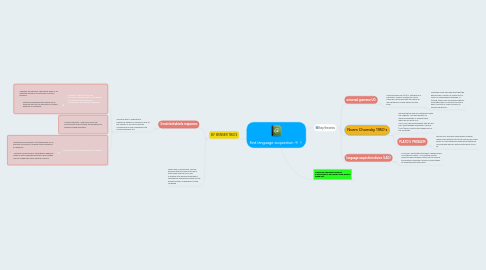
1. key theories
1.1. universal grammar UG
1.1.1. Universal grammar (UG)IS the theory in linguistics, usually credited to Noam Chomsky, proposing that the ability to learn grammar is hard-wired into the brain.
1.1.1.1. Chomsky made the argument that the human brain contains a limited set of rules for organizazing language .In turning, there is an assumption that all languages have a common structural basis .This set of rules is known as universal grammar.
1.2. Noam Chomsky 1950´s
1.2.1. introdeced the idea of innateness.Thata the capacity and the apratus for learning language is already there when we are born.As a NATIVIST,Chomske suggest that we are born with languge acquisition device (LAD) which controls the depeloves of the language.
1.2.2. PLATO´S PROBLEM
1.2.2.1. we are born as blank slates,where nothing make sense without structure.How do we make sense of first things we experience?therefore conclouding we born with innate ability to do so.
1.3. language acquisition divice (LAD)
1.3.1. cHOMSKY postulated that exist a especialised MIND/BRAIN faulty . It is institive mental capacity which anables to the chil to acquire and produce language which include stages of developement after birth.
2. B.F SKINNER 1960´S
2.1. 3 main behabiorla responses
2.1.1. The best way to understand behavioral aspect in children is look at the causes of an action operant conditioning 3 main responses that follow behavioral are
2.1.1.1. Punishers: response from the enviroment that decrease . the likehood of a behavior being repeated .punishments that aweaken behaviors.
2.1.1.1.1. Negative punishment: the taking away of an appetizer stimulus to decrease a certain behavior
2.1.1.1.2. Positive punishment:the adding of an aversive stimulus to decrease a cerntein behavior or response
2.1.1.2. Neutral operants : responses from the environment that increase the probelityof a behavior being repeated.
2.1.1.3. Reinforces can be either positive or negative
2.1.1.3.1. Negative reinforcement: the taking away of an aversive stimulus to increase certain behavior or response
2.1.1.3.2. : positive reinforcement: strengthens behavior within a child. Rewarding stimulus encourages child to repeat the same positive actions.

